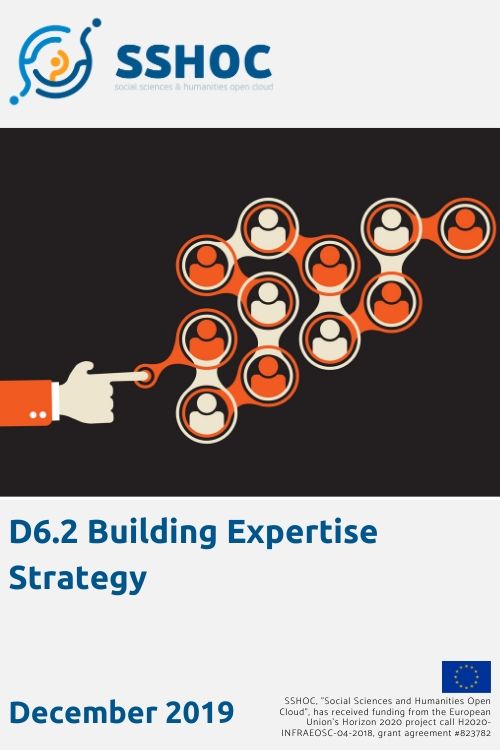
- Social Sciences & Humanities Open Cloud
D6.2 Building Expertise Strategy

Submission date:
17 December 2019
Following D6.2 - SSHOC Community Engagement Strategy and building upon it, the SSHOC project has created this Building Expertise Strategy. It describes an initial plan for the project’s activities and tools to be used in order to build expertise among user communities. Moreover, it provides a framework for SSHOC training activities that aim to empower the SSHOC network to a greater level of expertise in Open Science for SSH, utilizing SSHOC services, tools and data throughout the research lifecycle and according to the FAIR Principles.
In this sense, in collaboration and coordination, when possible and appropriate, with raising awareness activities, SSHOC is building its plan around three major tasks and certain types of activities: i) empowering users through existing and new training materials and online learning paths, ii) building expertise through the SSHOC Training Network and related tools (the SSHOC Train-the-trainer Toolkit, a recommended trainer directory, etc.) and activities (SSHOC train-the-trainer bootcamps, supporting training organizations in delivering national-level train-the-trainer workshops, identification of regional nodes, etc.) and iii) coordinating targeted training in the Social Sciences and Humanities, with the aim of developing a data-sharing culture following the FAIR principles.
Through building expertise and empowering its network, SSHOC aims to provide its community with the necessary knowledge, skills, and expertise required to appropriately, effectively, and efficiently use and contribute to the SSHOC resources - both from disciplinary and cross-disciplinary perspectives.
In this first phase of the project, we identified the major actors and audiences to be targeted, taking into account that (due to the nature of the project) the majority of the community is involved in SSHOC. At the same time, we identified, contextualized and (in many cases) established contact with training activities relevant for the project, especially in the cases where project partners either participate in these initiatives as partners or as experts/external actors, thus leveraging existing connections. Gaps and initiatives belonging to this category have been identified as well. In the course of the project, collaboration, coordination and/or co- location of activities will be established.
As the activities under WP6 - Fostering Communities, Empowering Users and Building Expertise run horizontally in the project, a procedure has been set up to spread training activities across the project. This procedure accounts for geographic and disciplinary distribution, as well as expertise levels and training needs of the audience, available resources and activities of other WPs (WP3, WP4, WP5, WP8 and WP9 in particular), in order to set KPIs. The general format of activities has been agreed, with flexibility allowed in terms of formatting each training activity as this will allow WPs to adapt to specific training needs and current developments.
This deliverable has been accepted by the European Commission on - 03 November 2020
Document:
Publication type:
Deliverable
